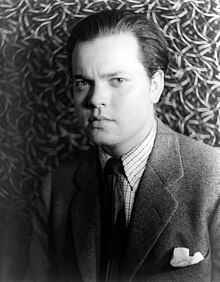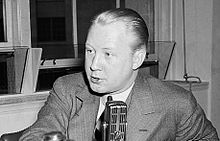History of CBS
The network became the home to many popular musical and comedy stars, among them Jack Benny ("Your Canada Dry Humorist"), Al Jolson, George Burns and Gracie Allen, and Kate Smith, whom Paley had personally selected for his family's La Palina Hour as she was not the type of woman to provoke jealousy in American wives.
[19] The low-key murmuring of smooth-voiced Tony Wons, backed by a tender violin, "made him a soul mate to millions of women"[20] on behalf of the R. J. Reynolds tobacco company, whose cellophane-wrapped Camel cigarettes were "as fresh as the dew that dawn spills on a field of clover".
"[23] At CBS, Just Plain Bill brought human insight and Anacin pain reliever into households; Your Family and Mine came courtesy of Sealtest Dairy products; Bachelor's Children first hawked Old Dutch Cleanser, then Wonder Bread; Aunt Jenny's Real Life Stories was sponsored by Spry Vegetable Shortening.
Since there was no blueprint or precedent for real-time news coverage, early efforts of the new division used the shortwave link-up CBS had been using for five years to bring live feeds of European events to its American air.
On March 12, 1938, Hitler boldly annexed nearby Austria, and Murrow and the Boys quickly assembled coverage with Shirer in London, Edgar Ansel Mowrer in Paris, Pierre Huss in Berlin, Frank Gervasi in Rome, and Trout in New York.
The flood of publicity after the broadcast had two effects: a 1992 FCC law banning faux news bulletins within dramatic programming, and sponsorship for The Mercury Theatre on the Air, becoming The Campbell Playhouse to sell soup.
[63] As Paley grew more remote, he installed a series of buffer executives who sequentially assumed more and more power at CBS: first Ed Klauber, then Paul Kesten, and finally Frank Stanton.
[64] He had come to the network in 1933 after sending copies of his Ph.D. thesis "A Critique Of Present Methods and a New Plan for Studying Radio Listening Behavior" to CBS top brass, and they responded with a job offer.
[72] The guidelines that the Office did issue banned weather reports (including announcement of sports rainouts), as well as news about war production or troop, ship, or plane movements, and live man-on-the-street interviews.
One day, while Freeman Gosden and Charles Correll were hard at work at NBC writing their venerable Amos and Andy series, Paley came to the door with an astonishing offer: "Whatever you are getting now I will give you twice as much.
As RCA and DuMont raced to establish networks and offer upgraded programming, CBS lagged, advocating an industry-wide shift and restart to UHF for their incompatible (with black and white) color system.
[98] Paley and network president Frank Stanton had so little faith in the future of Lucille Ball's series that they granted her wish and allowed her husband Desi Arnaz to take financial control of the comedy's production.
As such, the network had challenging fare like The Twilight Zone, The Defenders, and East Side/West Side, as well as The Andy Griffith Show, The Beverly Hillbillies, Gomer Pyle, U.S.M.C., and Gilligan's Island.
Perhaps because of its status as the top-rated network, CBS felt freer to gamble with controversial properties like the Smothers Brothers Comedy Hour and All in the Family (and its many spinoffs) during the late 1960s and early 1970s.
[103][104] CBS also cancelled the variety shows of Red Skelton, Ed Sullivan and Jackie Gleason not only because of aging demographics but also reportedly due to the escalating expenses of these programs.
It also held the distinction of having the largest single-night primetime viewership of any television program in U.S. history, until it was surpassed by the Super Bowl, which has taken the record consistently since 2010 (through the annual championship game alternates between being broadcast by CBS and rival networks Fox and NBC).
After Silverman's departure, CBS dropped to second place behind ABC in the 1976–77 season, but still rated strongly, based on its earlier hits and some new ones, including One Day at a Time, Alice, Lou Grant, WKRP in Cincinnati, The Dukes of Hazzard, Trapper John, M.D.
Under network president Jeff Sagansky, CBS was able to earn strong ratings from new shows Diagnosis: Murder, Dr. Quinn, Medicine Woman, Walker, Texas Ranger, Picket Fences, Northern Exposure, Evening Shade and a resurgent Jake and the Fatman.
CBS bore the brunt of the switches, losing its Phoenix, Milwaukee, Cleveland, Detroit, Austin, Dallas-Fort Worth, Wilmington, North Carolina, Tampa-St. Petersburg, Yuma and Atlanta affiliates to Fox; eight of those stations were owned by New World Communications.
During this time, several longtime affiliates beside the ones that were defected to Fox also defected from CBS in markets such as Anniston (WJSU-TV), Bakersfield (KERO-TV), Baltimore (WBAL-TV), Boston (WHDH-TV), Cincinnati (WCPO-TV), Denver (KMGH-TV), Eureka (KIEM-TV), Evansville (WEHT-TV), Fairbanks (KTVF), Flint (WEYI-TV), Fresno (KFSN-TV), Green Bay (WBAY-TV), Huntington (WCHS-TV), Jacksonville (WJXT), Knoxville (WBIR-TV), Louisville (WHAS-TV), Marquette (WLUC-TV), Miami (WTVJ), New Bedford (WLNE-TV), Omaha (WOWT), Philadelphia (WCAU-TV), Raleigh (WTVD-TV), Rochester (WHEC-TV), Salt Lake City (KSL-TV), Sacramento (KXTV), Seattle (KIRO-TV), Tuscaloosa (WCFT-TV) and West Palm Beach (WTVX).
CBS also featured several prominent sitcoms like Still Standing, Two and a Half Men, How I Met Your Mother, The New Adventures of Old Christine, Rules of Engagement, and The Big Bang Theory, as well as the reality show The Amazing Race.
Fox's first-place finish that season was primarily due to its reliance on American Idol (the longest reigning number-one primetime U.S. television program from 2004 to 2011) and the effects of the 2007–08 Writers Guild of America strike.
Meanwhile, Two and a Half Men saw its ratings decline to respectable levels for its final four seasons following the 2011 firing of original star Charlie Sheen and the addition of Ashton Kutcher as its primary lead.
As CBS wrote in a special report to the FCC, the unscheduled live news broadcast on December 7 was "unquestionably the most stimulating challenge and marked the greatest advance of any single problem faced up to that time".
This was primarily because much of the staff had either joined the service or had been redeployed to war-related technical research, as well as because it was necessary to prolong the life of the cameras, which were now impossible to repair due to the lack of parts available during wartime.
This version, starring Lesley Ann Warren and Stuart Damon in the roles formerly played by Julie Andrews and Jon Cypher, was shot on videotape (at its Television City complex in Los Angeles) rather than being telecast live, and would become an annual tradition on the network for the next nine years.
Despite releasing box office successes such as The Natural, Places in the Heart, and Rambo: First Blood Part II, CBS felt the studio was not making a profit, and sold its stake in TriStar to Columbia Pictures' then-corporate parent The Coca-Cola Company in 1985.
WINS, which had pioneered the all-news format in 1965, generally restricts its news coverage to the five core New York City boroughs, while WCBS, with its much more powerful signal, covers the surrounding tri-state metropolitan area.
In 1999, CBS paid $2.5 billion to acquire King World Productions, a television syndication company whose programs included The Oprah Winfrey Show, Jeopardy!, and Wheel of Fortune.
Series and other material in this library include I Love Lucy, The Honeymooners, The Twilight Zone, Hawaii Five-O (both the original and current remake), Gunsmoke, The Fugitive, The Love Boat, Little House on the Prairie (U.S. television rights only), Cheers, Becker, Family Ties, Happy Days and its spin-offs, The Brady Bunch, Star Trek, The Young Indiana Jones Chronicles (distribution rights on behalf of copyright holder Lucasfilm), Evening Shade, Duckman, CSI: Crime Scene Investigation and its spin-offs, the CBS theatrical library (including My Fair Lady and Scrooge), Judge Judy, Judge Joe Brown, Judge Mills Lane, and the entire Terrytoons library from 1930 forward.

















